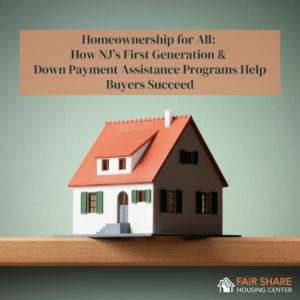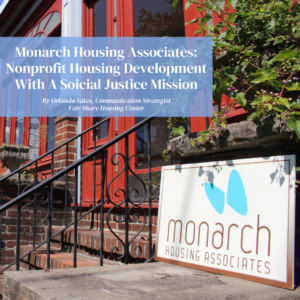Compliance: A Critical Step to Implementing Affordable Housing in New Jersey
March 28th, 2023
By Laura Smith-Denker
Following the New Jersey Supreme Court’s decision in Mount Laurel IV, every town that has filed a declaratory judgment since 2015 is ultimately seeking a final order that finds them in compliance and grants repose, meaning that their town has a realistic plan for fulfilling their affordable housing obligations and is no longer subject to Third Round litigation. The municipality must prove through a compliance package that they will implement the mechanisms to provide their fair share of the regions need of affordable housing. Compliance is a critical element of the process that ensures affordable housing will actually come to fruition, and it is a source for the public to better understand affordable housing in their neighborhood. However, it can also be a complex hurdle that slows the process and the issuance of a final order.
A compliance package implements the terms of the settlement agreement between FSHC and a given municipality, and is essentially the Housing Element and Fair Share Plan. It also contains all supporting documents such as spending plans, and all the implementing ordinances ranging from zoning, appointing administrative agents, or general affordable housing. The compliance package also requires the compilation of all documentation supporting units that will be counted towards a municipalities housing obligation. There can be many challenges to compiling this data from record keeping issues to changes in leadership during the process; therefore, it is critical that FSHC participates and reviews the compliance documents before the court holds a compliance hearing and approves a final judgment of repose. Once approved at a publicly noticed court hearing, these documents are then placed on file at the municipality for the public to review which is critical for ensuring that New Jersey’s residents are aware of, can find, and access affordable housing in their communities.
With over 300 settlements negotiated between municipalities
and FSHC, we have been diligent in our process to review and approve compliance to close out these cases. That said, many towns that we have successfully settled to the satisfaction of both sides have stalled in the compliance process. While it’s hard to point out one specific reason for this failure to finalize a case, in many towns we are seeing issues arise surrounding the proposed housing mechanisms agreed to in the settlement that determine whether a town can truly provide a realistic opportunity for affordable housing. The need to swap out mechanisms can lead to renegotiating settlements and needing to find creative alternatives. In some instances, towns may have already reached final repose when issues arise, typically discovered through required monitoring or reporting of all our settlement agreements, and new compliance documents are required to be adopted and approved. At this point, nearly 10 years after the Mount Laurel IV decision, it is rarely an easy task to resolve these outstanding cases, and it truly takes a team both within the walls of FSHC and beyond them through the collaborative efforts of planners, attorneys, court masters and judges to get to a final repose.
Despite an ongoing and fluid process, our goal still remains to finalize as many of our settled cases as we can to help towns be prepared to provide affordable housing and remain protected from Third Round litigation. We share this goal with the municipalities and courts who ultimately need that final repose order to close out the case. Our hope for 2023 is to resolve all our outstanding cases that have a settlement but have not yet crossed that threshold to final compliance.






